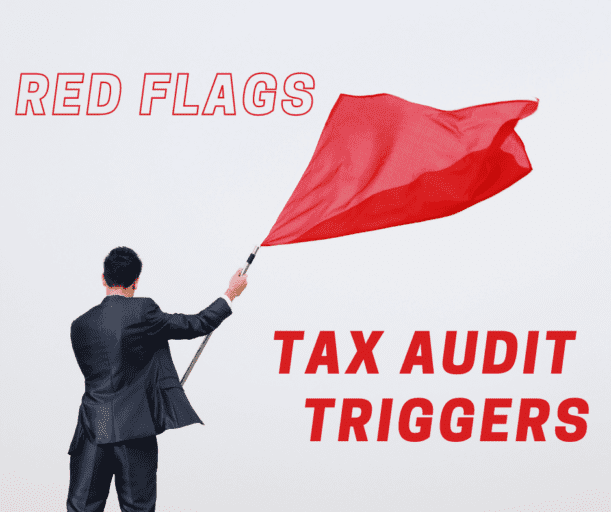
Glenn Harris
Director

How Can I Avoid triggering a Tax Audit?
The ATO has numerous and powerful tools at its disposal to conduct a tax audit on the affairs of Australian taxpayers.
Here are 5 of the top ways of triggering an ATO tax audit on your personal or business affairs.
1. Correctly Declare Taxable Income – While this may be obvious, the ATO’s enhanced data matching capabilities, now more than ever, allow the detection of unreported income. Making an incorrect declaration in these areas are red flags for the ATO, and could potentially trigger a tax audit on your business. This includes:
- Interest and dividends
- Capital gains on the disposal of property.
- Retail sales via credit cards and online sales
- Lifestyle which is not supported by your reported income. This may include your home, luxury cars and boats, or even exotic holidays posted on your social media.
- Income derived outside of Australia.
2. Business Performance Outside Industry Benchmarks – The ATO will routinely match your reported income and expenses to industry benchmarks. If you are outside these benchmarks, this may indicate the understatement of taxable income, resulting in a tax audit.
3. BAS Does Not Reconcile to Tax Returns – To avoid a tax audit, it is critical items reported in your BAS reconcile to your annual tax returns. This includes all reporting items in both BAS and tax return.
4. Late or Underpaid Superannuation – Single Touch Payroll (STP) has now been operational for all employers for 2 years. The ATO is receiving live data each time your employees are paid. Furthermore, employees are watching their superannuation account balances. Not paying their super or paying it consistently late is a likely way for employees to report you to the ATO. A disgruntled employee attracting the ATO for a review of their superannuation may result in triggering a complete tax audit on your business.
5. Poor lodgement or Payment History – Consistently being late with ATO lodgements and payments is a way to raise a reg flag.
To minimise the chances of an ATO tax audit, you should ensure you have actively addressed each of the 5 items above. Other key items to consider:
- You should seek professional advice before reporting, especially if you have any uncertainty on how to report an item to the ATO,
- Finding a previously undetected error in your reporting means you need to seriously consider correcting this with the ATO. If you rectify an error before a tax audit has commenced, you may significantly reduce any interest and penalties which may be charged.
- If you cannot make a payment to the ATO by the due date, make the lodgement and enter a payment arrangement. It is important to comply with all the conditions in any payment arrangement agreed with the ATO.
- Consider taking out Audit insurance. This will cover professional costs (lawyers and accountants) to support you should a tax audit commence.
How will the ATO crack down on taxpayers?
The ATO has a variety of methods to protect revenues and collect overdue debts. They already have an existing, well-established, tax audit program for privately owned groups.
The ATO supports privately owned and wealthy groups to pay the right amount of tax through three tax performance programs designed to:
- Support willing participation in the tax system.
- Help them to get things right.
- Find and address deliberate tax avoidance.
You can read more about the top 500 private groups tax performance program, which is a key element of the Tax Avoidance Taskforce, on the ATO website.

Specific Data Matching Programs
The ATO collects an enormous amount of data from other Australian Government agencies, financial institutions and state based agencies. The ATO also matches data reported in income tax returns and BAS lodgements. The ATO is currently running the following specific data-matching programs in an aim to ensure the integrity of the Australian tax system.
- Credit and Debit Cards – Data from all financial institutions is used to identify the total credit and debit card payments received by Australian businesses.
- Specialised Payment Systems – Electronic payments made through specialised payment systems to Australian businesses, is analysed in conjunction with data collected through the credit and debit card data-matching program.
- Online Selling – Online selling sites and marketplaces are required to provide sales data to the ATO where the business is operated in Australia, and where a client or business on that site has annual trading activity greater than $12,000.
- Ride-Sourcing – The ATO obtains data from all ride-sourcing facilitators and their financial institutions to identify ride-sourcing drivers. They then matched this data with their Australian tax return.
- Motor Vehicle Registries – Data from all the state and territory motor vehicle registering bodies is sent to the ATO. This data is used to identify all motor vehicles sold, transferred, or newly registered, where the transfer or market value is $10,000 or more.
- Cryptocurrency – Data from Australian cryptocurrency service providers is submitted to the ATO to ensure people trading in cryptocurrency are paying the right amount of tax.
ATO’s Sympathetic approach
Mid last year, the ATO told a parliamentary inquiry it would transition to a more “sympathetic and understanding” approach on compliance activities. This was due to ongoing uncertain economic conditions. Taxpayers were also concerned about the ATO’s approach towards Job Keeper turnover estimates. This means activity triggering a tax audit during this time may have been overlooked somewhat. To date, this “sympathetic and understanding” approach has continued, but for how long is anybody’s guess?
It is not a good strategy to enter into any activity in regard to your business or personal tax affairs, which may put up a red flag to the ATO and potentially trigger a tax audit in the future.
What does this mean for me – Impact on my business?
As the pandemic and associated stimulus now subside, the Government, via the ATO, will be making it a priority to increase revenue collections and reduce the debt on the ATO’s books. While late last year the ATO announced it would begin with a soft re-engagement approach with taxpayers, we can expect to see in the next 12 months significant resources provided to the ATO to support with its revenue protection and debt collection responsibilities. This will likely include more tax audits.
With so many data matching points and insights from their own data, finding discrepancies in your tax return has never been easier for the ATO. Being selected for a tax audit by the ATO can be time-consuming ( the worst case scenario up to 3-4 years to complete), arduous with ongoing face-to-face meetings as well as requests for financial records up to 5 years prior, and costly sometimes running into the tens of thousands of dollars. To avoid the burden of an ATO tax audit, it is more important than ever for you to have your tax affairs in order.


